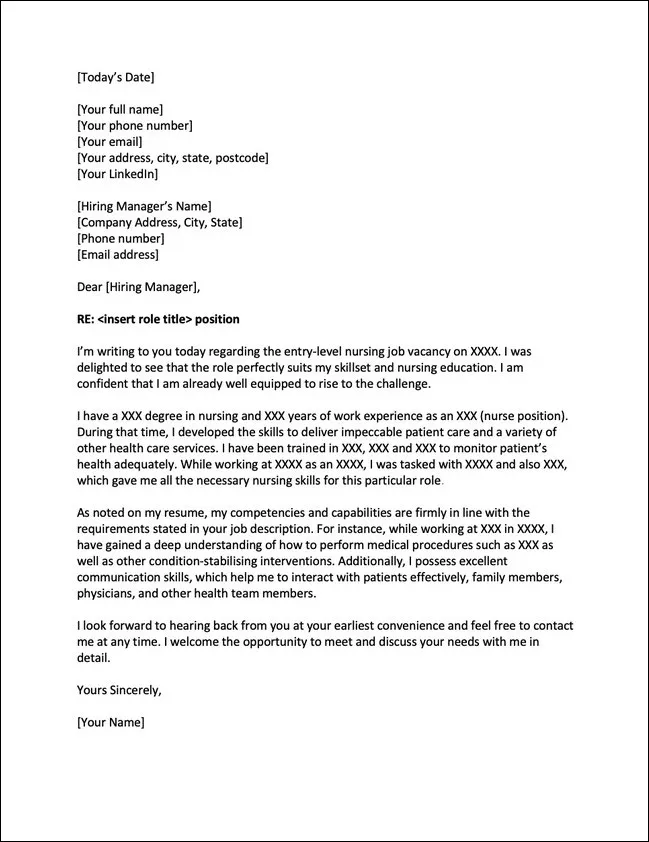What is a Nursing Cover Letter?
A nursing cover letter is a crucial document that accompanies your resume when applying for nursing positions. It serves as your personal introduction, allowing you to highlight your qualifications, skills, and experiences in a way that a resume alone cannot. It’s your opportunity to showcase your personality, express your passion for nursing, and demonstrate why you’re the ideal candidate for the specific role. A well-crafted cover letter can significantly increase your chances of getting noticed by hiring managers and securing an interview. It is a vital component of a successful job application in the competitive field of healthcare.
The Purpose of a Nursing Cover Letter
The primary purpose of a nursing cover letter is to provide context to your resume and elaborate on your qualifications. It allows you to explain how your skills and experiences align with the specific requirements of the job. It’s also a way to express your genuine interest in the position and the organization, demonstrating that you’ve done your research and understand their needs. A strong cover letter conveys your professionalism, attention to detail, and your ability to communicate effectively. Moreover, it provides you with the opportunity to address any potential gaps in your resume or explain career transitions.
Why is a Cover Letter Important for Nurses?
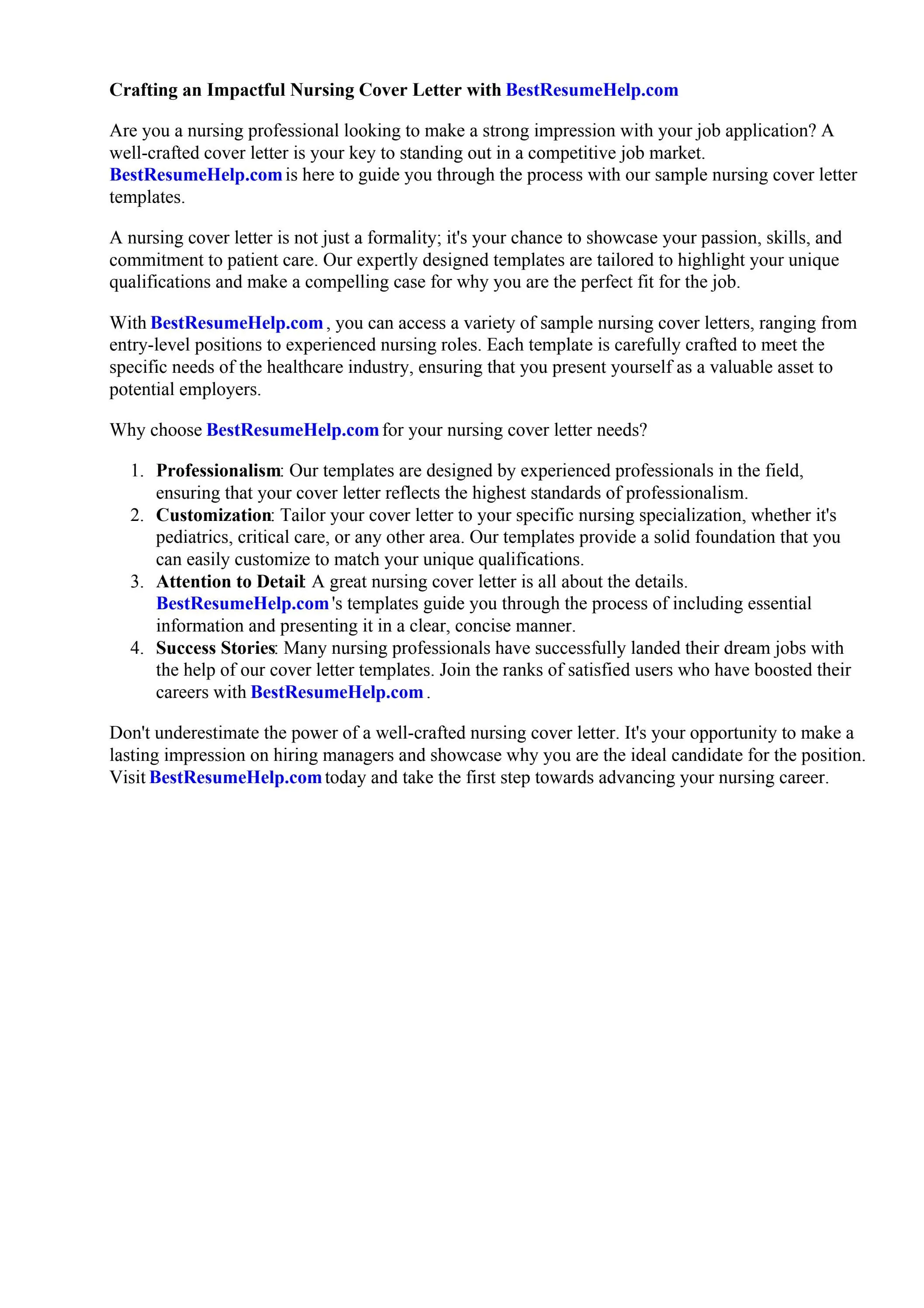
In the nursing profession, where compassion, communication, and critical thinking are paramount, a cover letter becomes exceptionally important. It provides an opportunity to illustrate these soft skills through your writing style and the way you present your information. Nurses often deal with sensitive situations, requiring clear, empathetic, and concise communication. A well-written cover letter demonstrates these qualities, assuring the hiring manager that you possess the interpersonal skills needed to excel in a patient-centric environment. Furthermore, cover letters allow you to personalize your application, showing that you’re not just sending out generic resumes but are genuinely interested in the specific role and organization.
How to Write a Nursing Cover Letter
Header and Contact Information
Begin your cover letter with a professional header that includes your full name, address, phone number, and email address. Make sure your contact information is accurate and up-to-date. If you’re applying online, consider using a professional-looking email address. Also, include the date and the hiring manager’s name and title, if known. If you cannot find the hiring manager’s name, address the letter to the ‘Hiring Manager’ or the ‘Human Resources Department’ of the specific healthcare facility or hospital.
Greeting and Salutation
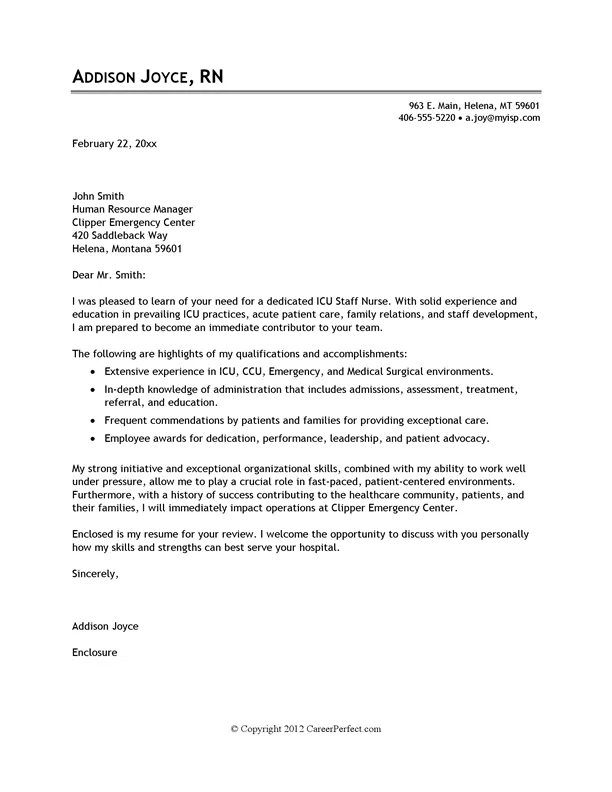
Start your cover letter with a formal greeting, such as ‘Dear Mr./Ms./Mx. [Last Name]’ if you know the hiring manager’s name. If you don’t know the name, use a professional greeting like ‘Dear Hiring Manager.’ Avoid generic greetings like ‘To Whom It May Concern.’ This opening sets the tone for your letter and shows that you are attentive to detail. Tailor the greeting to the specific organization; this shows that you have taken the time to learn a little about the organization and the team. This personalization can go a long way in making a positive first impression.
Opening Paragraph
The opening paragraph should immediately grab the reader’s attention. State the position you are applying for and where you found the job posting. Briefly mention your qualifications and express your enthusiasm for the role and the organization. This is your first chance to make a positive impression, so ensure your opening is concise, compelling, and clearly states your purpose. For example, you might say, ‘I am writing to express my keen interest in the Registered Nurse position at [Hospital Name], as advertised on [Platform]. With my five years of experience in critical care and my passion for patient-centered care, I am confident I can contribute significantly to your team.’
Body Paragraphs
The body paragraphs are where you elaborate on your skills, experience, and qualifications. Focus on how your abilities align with the job requirements. Provide specific examples of your accomplishments and how you’ve contributed to previous healthcare settings. Highlight any specialized skills, certifications, or experiences that make you a strong candidate. This section should demonstrate your understanding of the role and your ability to perform the necessary duties effectively. Structure your paragraphs logically and use clear, concise language to convey your points effectively. Use action verbs to describe your achievements and quantify your results whenever possible.
Highlight Relevant Skills and Experience
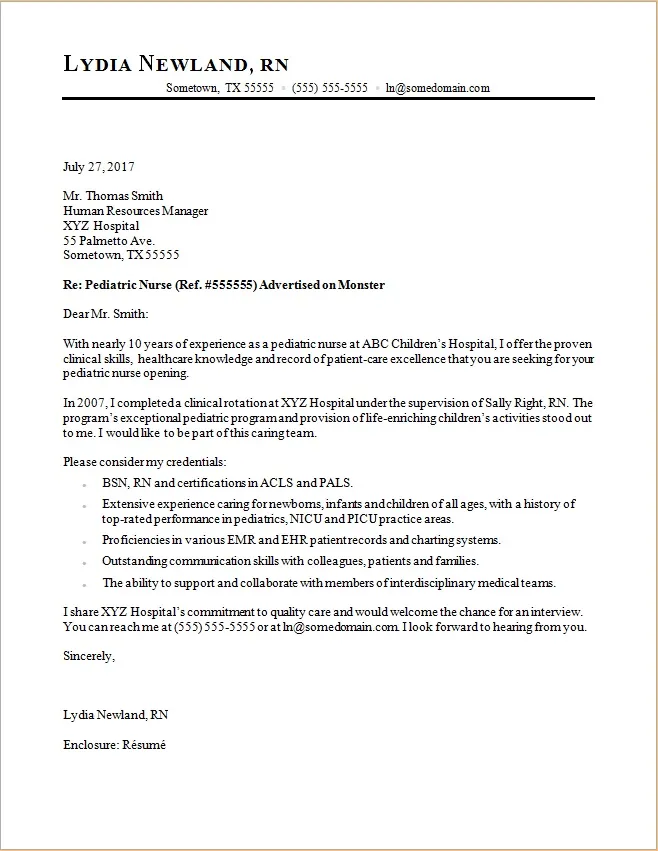
Carefully review the job description and identify the key skills and experiences the employer is seeking. Then, in your cover letter, explicitly state how your skills and experiences meet those requirements. Provide specific examples from your past roles to demonstrate your proficiency in those areas. For example, if the job description emphasizes the need for strong patient assessment skills, describe a situation where you successfully assessed a patient’s condition, identified a problem, and implemented an effective intervention. Tailor your cover letter to each job application, highlighting the experiences and skills that are most relevant to the specific position.
Quantify Achievements
Whenever possible, quantify your achievements using numbers and data to provide concrete evidence of your accomplishments. For instance, instead of saying ‘Improved patient outcomes,’ state ‘Improved patient outcomes by 15% through the implementation of a new care protocol.’ Quantifying your achievements makes your cover letter more impactful and demonstrates your ability to make a real difference in a healthcare setting. Use metrics such as reduced medication errors, improved patient satisfaction scores, or increased efficiency in care delivery to showcase the value you bring to the organization. This level of detail helps the hiring manager understand the tangible benefits of hiring you.
Tailor to the Specific Job
Avoid sending out a generic cover letter. Customize each letter to match the specific job and organization you are applying to. Research the healthcare facility or hospital and understand its mission, values, and recent initiatives. Highlight how your skills and experiences align with the organization’s goals. Demonstrate your knowledge of the facility’s culture and how you can contribute to its success. Mention any specific projects or initiatives that resonate with the organization’s objectives. Tailoring your letter shows that you’ve taken the time to understand the role and that you are genuinely interested in working for that particular employer.
Closing Paragraph
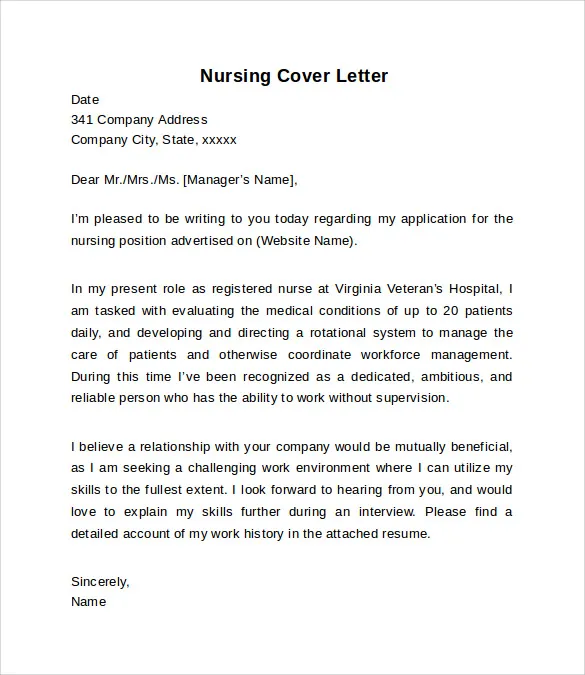
In your closing paragraph, reiterate your interest in the position and thank the hiring manager for their time and consideration. Briefly summarize your key qualifications and express your enthusiasm for the opportunity to discuss your application further. Ensure you express your availability for an interview and how they can contact you. This is a crucial part of your cover letter. The closing paragraph gives you a chance to leave a lasting positive impression and encourage the hiring manager to take the next step, which is setting up an interview.
Express Enthusiasm and Call to Action
End your cover letter with a strong call to action, encouraging the hiring manager to take the next step. Express your enthusiasm for the role and reiterate your interest in discussing your qualifications further. Provide your contact information and clearly state your availability for an interview. For example, you might say, ‘I am very enthusiastic about the opportunity to join [Hospital Name] and contribute to your team. I am available for an interview at your earliest convenience and can be reached at [Phone Number] or [Email Address]. Thank you for your time and consideration.’ This leaves the hiring manager with a clear understanding of what to do next.
Formatting Tips for a Nursing Cover Letter
Font and Readability
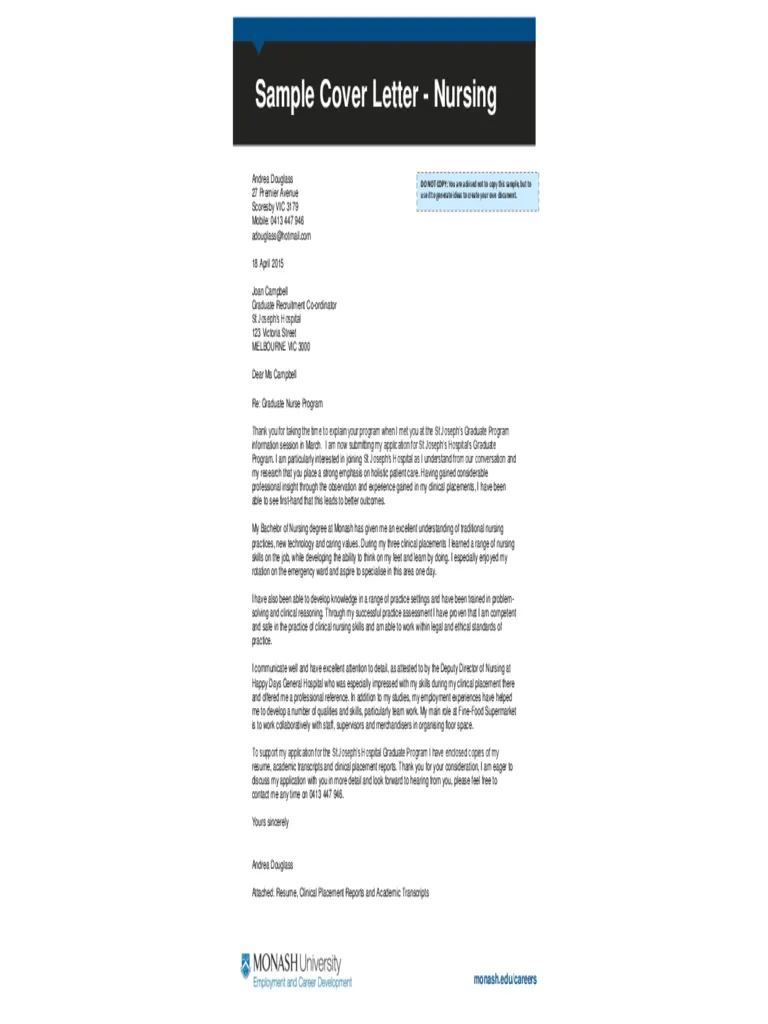
Choose a professional and easy-to-read font, such as Times New Roman, Arial, or Calibri. Use a font size between 10 and 12 points for optimal readability. Maintain consistent formatting throughout the letter, including font style, size, and spacing. Use clear headings and subheadings to break up large blocks of text and improve readability. Make sure the letter looks clean and organized. Use standard margins and a single space between lines and paragraphs. Avoid using overly decorative fonts or excessive bolding or italics, as these can distract the reader.
Length and Structure
Keep your cover letter concise and to the point, ideally within one page. Structure your letter logically, with a clear introduction, body paragraphs highlighting your skills and experiences, and a strong closing. Use a professional business letter format. This format typically includes your contact information, the date, the hiring manager’s information, a formal greeting, the body paragraphs, a closing paragraph, and a professional closing such as ‘Sincerely’ or ‘Best regards.’ Ensure your letter has a clear flow and easy to follow. Prioritize the most relevant information to the job you are applying for.
Proofreading and Editing
Proofread your cover letter carefully for any grammatical errors, spelling mistakes, or typos. Ensure your writing is clear, concise, and professional. Check for consistency in formatting, such as spacing and punctuation. Ask a friend, family member, or career advisor to review your cover letter for feedback. A fresh pair of eyes can often catch errors that you might miss. Proofreading is crucial to ensure your cover letter presents you in the best possible light and avoids potential misinterpretations by the hiring manager. Run the letter through a grammar and spell-checking tool.
Nursing Cover Letter Samples and Examples
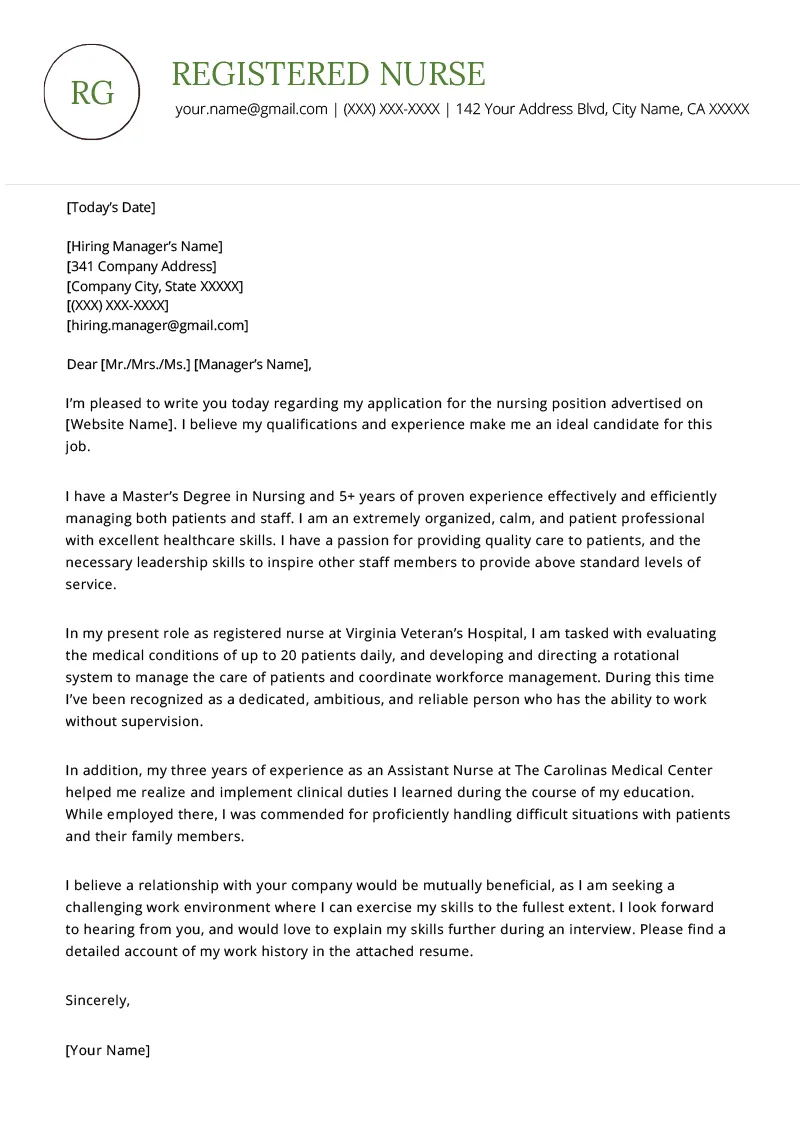
Sample Cover Letter for Registered Nurse
Here’s a basic sample cover letter tailored for a Registered Nurse (RN) position, you can use it as a starting point and tailor it to your experience and the specific job you’re applying for. Remember to customize it with your skills, experiences, and the requirements of the job posting. Focus on the specific requirements mentioned in the job description. Make sure the language is professional and reflects your enthusiasm and qualifications. Always proofread the cover letter before submitting your application.
Sample Cover Letter for Licensed Practical Nurse
Here’s a sample cover letter that is geared towards a Licensed Practical Nurse (LPN) position. LPNs often have a slightly different scope of practice than RNs, so be sure your letter accurately reflects your specific skills and experience. Highlight your ability to provide patient care, assist with medical procedures, and collaborate with other healthcare professionals. Tailor your letter to emphasize your practical skills and your commitment to providing quality patient care. The goal is to present yourself as a well-rounded and capable healthcare professional ready to contribute to a healthcare team and provide the best patient experience.
Sample Cover Letter for Nurse Practitioner
Below is a sample cover letter for a Nurse Practitioner (NP) position. Nurse Practitioners are advanced practice registered nurses who often have more responsibility regarding patient care. Emphasize your experience with diagnosing and treating illnesses, prescribing medications, and managing patient care plans. Highlight any specialized certifications or experiences, and focus on your ability to lead and make independent decisions. Your ability to independently assess and manage patient needs is crucial. Tailor your letter to reflect your skills and experiences. Demonstrate your readiness to take on a leadership role and make a positive impact on patient outcomes.
Common Mistakes to Avoid
Generic Content
Avoid using a generic cover letter that is not tailored to the specific job or organization. A generic letter doesn’t demonstrate your genuine interest and can make it seem like you’re sending out mass applications. Customize each cover letter to match the specific requirements of the job posting and the values of the organization. Research the facility or hospital and highlight how your skills and experiences align with their goals. Personalize your letter to reflect your enthusiasm for the role and your understanding of the organization’s mission. A tailored cover letter makes a much stronger impression and increases your chances of getting noticed.
Typos and Grammatical Errors
Typos and grammatical errors can undermine your professionalism and attention to detail. Always proofread your cover letter carefully before submitting it. Use spell-check and grammar-check tools, but also have a friend or colleague review your letter. Errors can create a negative impression. Take the time to revise and edit your cover letter until it’s error-free. Ensuring your cover letter is free from errors shows that you are detail-oriented and committed to excellence. Proofreading is a critical step to ensure your cover letter conveys your best qualities.
Ignoring the Job Description
Don’t ignore the job description when writing your cover letter. The job description is your guide to the skills, experience, and qualifications the employer is seeking. Carefully review the job description and tailor your cover letter to address those specific requirements. Highlight how your skills and experiences align with the job description, and provide specific examples of your accomplishments. Failing to address the job description’s requirements can make it seem like you haven’t carefully considered the role. Always tailor your cover letter to ensure you’re showcasing your qualifications and directly addressing the employer’s needs.
Key Skills and Keywords for Nursing Cover Letters
Clinical Skills
Include skills relevant to patient care, such as medication administration, wound care, vital signs monitoring, and patient assessment. Emphasize your experience with specific medical procedures and equipment. Mention any specialized skills, such as experience in critical care, emergency medicine, or specific patient populations. Be clear and concise about your specific expertise and how you have applied those skills in previous roles. Show that you are a well-rounded healthcare professional with a range of clinical abilities.
Soft Skills
Highlight your interpersonal skills, such as communication, empathy, active listening, and teamwork. Mention your ability to build rapport with patients and their families. Stress your problem-solving skills, your ability to work under pressure, and your adaptability. Mention your leadership abilities, and the skill to make decisions and provide effective care in critical situations. Present your skills in a way that demonstrates you have the necessary soft skills to excel in a patient-centric environment.
Technical Skills
Mention any relevant technical skills, such as experience with electronic health records (EHR) systems. Detail any experience with medical equipment or technology, and your understanding of healthcare software and data management. Demonstrate your computer literacy and your ability to use various healthcare technologies. This shows you are prepared for the technological demands of modern healthcare.
Final Thoughts and Next Steps
Writing a nursing cover letter requires careful planning, attention to detail, and a focus on highlighting your skills and experiences. By following the guidelines in this guide, you can create a compelling cover letter that increases your chances of getting noticed by hiring managers. Remember to tailor your letter to each job application, proofread carefully, and express your enthusiasm for the role. A well-crafted cover letter can make a significant difference in your job search and help you achieve your career goals in the nursing field. Use this guide to create a cover letter that is tailored to the specific job.
